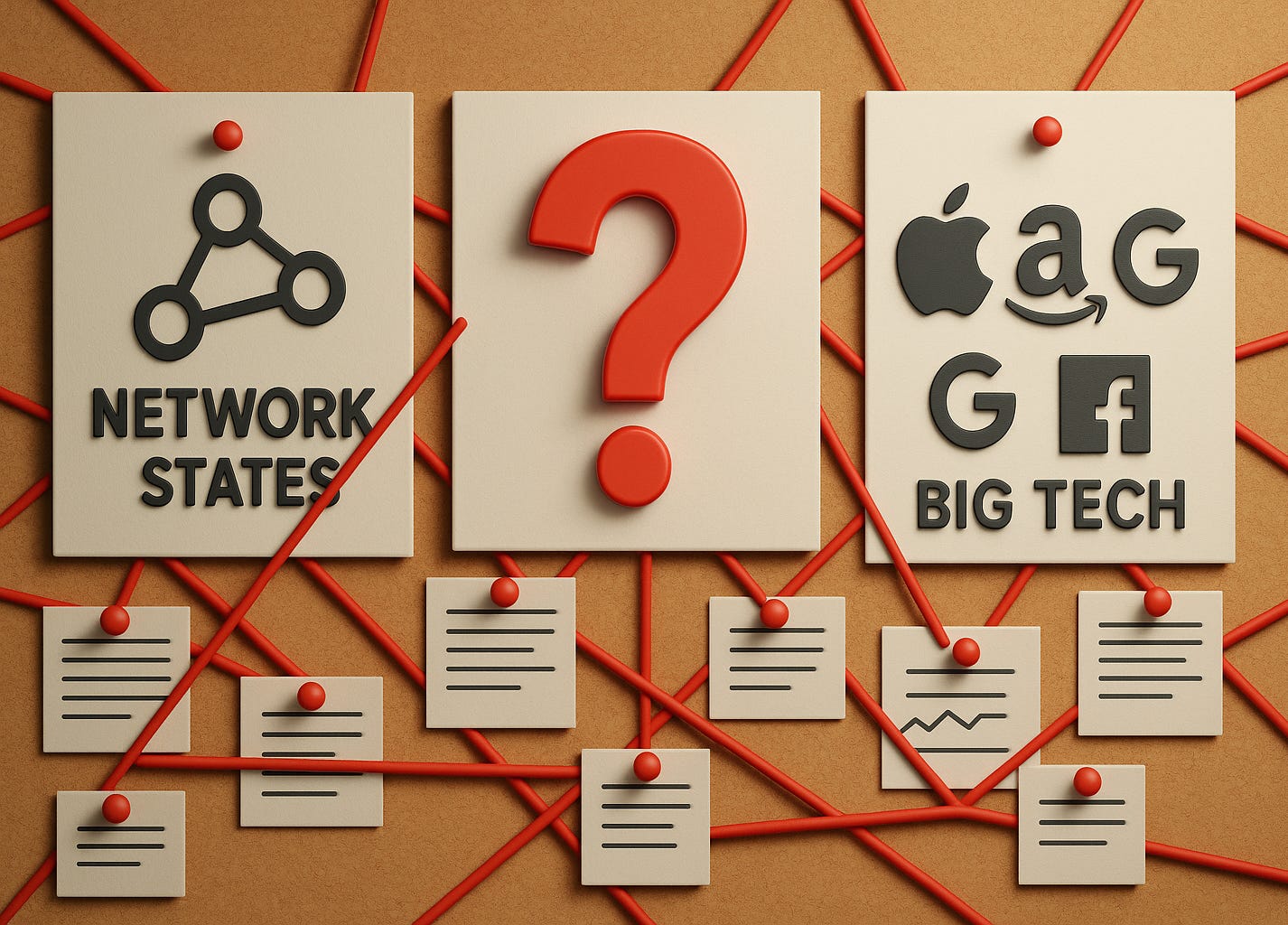The Internet Is the Greatest Democracy, but It Needs a Native Currency!
Bitcoin is the Internet’s biggest opportunity to reclaim freedom, censorship resistance, and the nostalgia that attracted so many of us the first time around. Here are my thoughts about this...
Joël here! 👋
I grew up on the Internet, and yes, I was definitely one of these weird, isolated kids in real life.
That was OK. I knew I had an outlet after school to dive into and connect with my other weird (to me normal) friends online.
The Internet is the greatest Democracy (and no, I don’t mean it in the mainstream “we gotta save democracy” way), which is in desperate need of protection.
It’s the only place where you can be your true self. There will always be a tribe for you, and generally speaking, people welcome debates and exchanges of thoughts.
But the Internet has been under attack for the last 15 years, mainly by monopolies that seek to maintain their dominance.
One way to take this power away from them and give it back to the people is Bitcoin and new concepts such as Network States.
Here are my thoughts!
Why the Internet Is the Perfect Form of Democracy
The Internet has seen three phases in its lifetime:
First was the research phase in the late eighties, early nineties.
Second was the early adopters phase, spanning the late 1980s to the early 2000s.
Lastly, the major push to mobile and web-based applications occurred in the 2010s.
I’m simplifying the entire timeline here, but that was more or less the timeline of the last couple of decades.
But these shifts and the emergence of consumer technologies are not the main reason why I call the Internet the perfect Democracy.
The main reason for this is its structure and openness. See, years ago, before algorithms determined how we live our lives, you actually had to look for interesting stuff.
That curiosity led you to online forums, message boards, or crazy ideas like: Let’s put books on the Internet and sell them in an online store.
At this point, mainly because the Internet was growing rapidly, driven by a generation eager to learn more about it, so-called experts came out and spoke against it.
Calling it a passing fad, something not to take seriously, something that could shake the “bedrock of democracy” (aka be a danger to the current power monopoly called the Big State), and something we need to regulate or ideally, close down.
But here’s the kicker: People didn’t care and started embracing the possibility of learning how to publish something online and finally be able to have a voice as well.
Since the Internet was the hot new thing, everyone jumped on board, essentially giving the establishment and any monopoly trying to fight it a giant middle finger.
We saw this with start-ups emerging in Silicon Valley, through which consumer computing became the golden standard, or with the fight of Pirate Bay against monopolies like Sony.
The little guys won because, rather than following laws in the physical world, they made their own by writing code, publishing content, inspiring people, and creating better protocols.
However, there was one fatal flaw: Humans are corruptible, and the more power someone gets, the more likely he is to flip.
This is what we saw with early Internet companies like Google, Amazon, and Apple.
Additionally, we still had one major problem: the Internet lacked a native currency, relying on outdated infrastructure for payments.
A factor that could hinder the development of early projects, such as e-commerce and online payment capabilities, is the lack of infrastructure.
Eventually, the Internet infrastructure caught up, but it had a fatal flaw: it had to rely on centralized entities, from applications to app stores, and even the money or payment solutions we use daily.
The Issue With Monopolies and Big Tech Capture
The Internet was born as a peer-to-peer revolution, a decentralized dream where information could flow freely between equals.
But here we are in 2025, and that dream has been systematically corrupted by a handful of tech monopolies who've captured the very essence of what made the Internet magical.
Google, Meta, Apple, Amazon - these aren't just companies anymore, they're digital nation-states with more power over information flow than most governments.
The irony is breathtaking. These platforms built their empires on the open protocols of the Internet, then immediately locked everything down behind proprietary walls.
They've transformed the Internet from a decentralized network into a series of walled gardens, each extracting maximum value from users while giving back minimal control.
Look at what's happening in courtrooms across America and Europe right now. Google is defending itself against antitrust charges that could reshape the entire search landscape.
Meta is constantly battling regulators over content moderation and data privacy. Apple faces scrutiny over its App Store monopoly.
These legal battles aren't coincidences - they're the inevitable consequence of companies that have grown so large they've forgotten the fundamental principles that made their success possible.
If Big Tech truly embraced the original vision of the Internet, it’d be champions of free speech, open protocols, and user sovereignty.
Instead, they've become the very centralized gatekeepers the Internet was designed to eliminate.
They control what you see, what you can say, and how you can interact with others online.
While initiatives exist to break up these powers, Bitcoin, for instance, is doing the same with money; however, they lack widespread adoption and the simplicity of use.
This isn't the Internet we were promised - it's digital feudalism where users are serfs and Big Tech are lords.
How Bitcoin and Network States Will Solve This Problem
Enter the concept of Network States, brilliantly articulated by Balaji Srinivasan, which represents a fundamental reimagining of how communities organize in the digital age.
I think Balaji did a brilliant job in explaining why the Internet has lost its edge (mainly because of centralized media as well as the lack of understanding of tech) and how his idea of Network States could solve that problem.
Source: YouTube
Network States aren't just online communities - they're digitally-native nations that exist first in cyberspace, then gradually gain physical territory and diplomatic recognition.
This model flips the traditional nation-state paradigm on its head, allowing like-minded individuals to form governance structures based on shared values rather than geographic accidents.
But here's where it gets really exciting: every functional Democracy needs a native currency, and that's where Bitcoin becomes essential.
Bitcoin isn't just digital money - it's the monetary infrastructure that makes Network States economically viable and truly sovereign.
Without Bitcoin, Network States would be forced to rely on legacy financial systems controlled by the very centralized powers they're trying to escape.
With Bitcoin, they can operate entirely independently, conducting commerce, paying taxes, and building wealth without permission from traditional banking cartels.
Bitcoin's fixed supply schedule means Network States can build long-term economic planning without worrying about monetary debasement by hostile central banks.
This combination - Network States for governance, Bitcoin for money - creates a pathway back to the Internet's original peer-to-peer vision.
Instead of being subjects of Big Tech platforms, users become citizens of communities they actually choose and help govern.
The result? A Cambrian explosion of new organizational forms, each experimenting with different approaches to digital governance and economic coordination.
What the Internet of the Future Will Look Like
Picture this: an Internet that recaptures the raw enthusiasm and boundless creativity of the early days, but powered by the sophisticated infrastructure we've built over the past three decades.
We're talking about a return to the hacker ethos, where anyone with curiosity and determination could build something amazing and change the world overnight.
But instead of dial-up bulletin boards, we have Lightning-powered micropayments enabling new business models that were impossible in the advertising-driven Web 2.0 era.
Network States compete not through military force or regulatory capture, but by creating the most attractive environments for human flourishing.
Citizens vote with their Bitcoin wallets, migrating to communities that offer the best governance, economic opportunities, and cultural alignment.
Pure Democracy becomes possible at scale because voting isn't just about political representation - it's backed by actual economic skin in the game.
Bitcoin eliminates the traditional need for geographical taxation, allowing truly voluntary governance where citizens pay for services they actually want and use.
AI becomes a massive accelerant for this transformation, automating away the bureaucratic friction that makes traditional governance so inefficient and corrupt.
Smart contracts handle routine administrative tasks, while AI assists in translating between different languages and cultural norms across Network States.
The result is a renaissance of human creativity and innovation, unleashed from the constraints of both Big Tech monopolies and legacy nation-state bureaucracies.
We're not just rebuilding the Internet - we're building the foundation for a new chapter in human civilization.
One where technology serves individual sovereignty rather than corporate extraction, where communities form around shared values rather than arbitrary borders.
The tools are already here: Bitcoin for money, Lightning for payments, AI for automation, and the Internet for coordination.
All that's left is for enough people to recognize that the future doesn't have to look like the present and start building it.
Wouldn’t that be a future worth fighting for?




"I have a dream....." (Martin Luther King). We need new dreams for shaping a better future. Thank you Joel for working on and with ideas for a wonderful future.